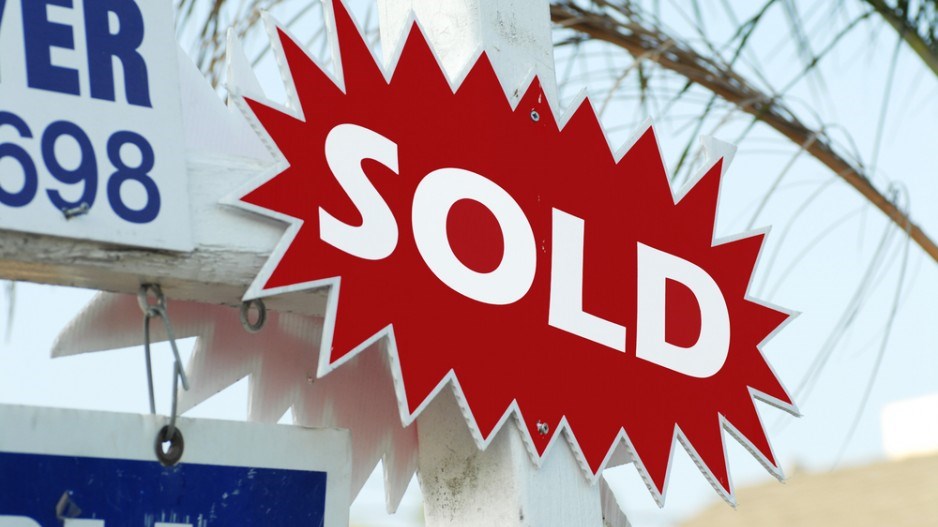A total of 1,484 home sales took place across the Metro Vancouver region in February, which is down 32.8% year-over-year and is 42.5% below the 10-year average for the month (see graph below), according to Real Estate Board of Greater Vancouver (REBGV) data released March 4.
This sales total is a 34.5% increase compared with January, however, as the market started to see its usual uptick approaching spring.
The number of homes for sale in the region, as of the end of February, is nearly 50% higher than the same month in 2018, and 7.2% more than in January this year, at 11,590. But fewer sellers took their homes to market this February, with new listings down 7.8% year over year and down nearly 20% from January, perhaps because of nervousness over the slow market.
One of the key indicators of the strength of the market is the sales-to-active-listings ratio, which in January took the region into buyer’s market territory at just 10.2%. However, February’s improvement in sales pushed the ratio back up to 12.8%, edging back into more of a balanced market. A buyer’s market is considered to be in play when the ratio is less than 12% for a sustained period of several months.
Phil Moore, REBGV president, said, “Realtors continue to experience more traffic at open houses. We’ll see if this trend leads to increased sales activity during the spring market.”
So what does all this mean for home prices?
The composite benchmark price for Metro Vancouver homes is currently $1,016,600. This is a 6.1% drop since February 2018, and a 0.3% slip compared with January 2019.
“Home buyers face less competition today, have more selection to choose from and more time to make their decisions. Homes priced well for today’s market are attracting interest. However, buyers are choosing to take a wait-and-see approach for the time being,” added Moore.
However, as is usually the case, the story diverges greatly when breaking it out by property type, with condo prices still proving relatively resilient.
Sales and prices by home type and area
Having gone through a steeper decline, detached home sales in the region saw the lowest annual decline, compared with townhomes and condos. There were 448 single-family home sales in February, which is 27.9% lower than the same month in 2018, but 32.2% higher than January (339 sales).
The benchmark price of a typical detached home in the region is $1,443,100, which is 9.7% decrease from February 2018, and a 0.7% decline from January 2019.
Once again, West Vancouver and Vancouver West saw the sharpest declines in detached home prices, down 16.7 and 13.5% respectively, with Richmond and North Vancouver also seeing more than double-digit decreases. The Sunshine Coast and Bowen Island remained the most resilient, with prices up 3.2 and 1.6% respectively, although the size of those annual increases is slipping. Squamish and Whistler also saw detached prices increase on a year-over-year basis.
Attached houses such as townhouses, duplexes and rowhomes saw sales across Metro Vancouver decline 30.9% year over year to 401 in February. However, February’s total is nearly double the 205 attached sales of January 2019.
The typical price of an attached home in Metro Vancouver is now pegged at $660,300, which is 3.3% lower than February 2018, and 1.4% down from January 2019.
The steepest townhome price slides were in Tsawwassen and Maple Ridge, down 7.0 and 7.1% year over year respectively. The only annual rise in benchmark townhome prices was a modest 0.3% increase in Burnaby East.
Condo sales in Metro Vancouver jumped the most in volume, on a month-over-month basis. There were 759 condo sales in February, compared with 559 in January, which is a 35.7% increase. However, that 759 total is also 35.9% lower than one year ago.
Condo benchmark prices fell 4%, year over year, to $660,300. However, this is a 0.3% increase compared with January 2019, making condos the only property type to see a slight uptick in prices so far this year.
West Vancouver’s typical condo price fell the most out of all Metro Vancouver’s areas, down 10.8% year over year, followed by Burnaby East (-9.6%) and Whistler (-9.3%). Tsawwassen, Ladner and Port Coquitlam all saw slight year-over-year increases in condo prices.even areas (out of 18) saw month-over-month increases in condo benchmark prices, including Vancouver East and Vancouver West.
Home prices vary widely in different areas throughout the region. To see REBGV’s full report, click here: REBGV stats package
Glacier Media Real Estate




